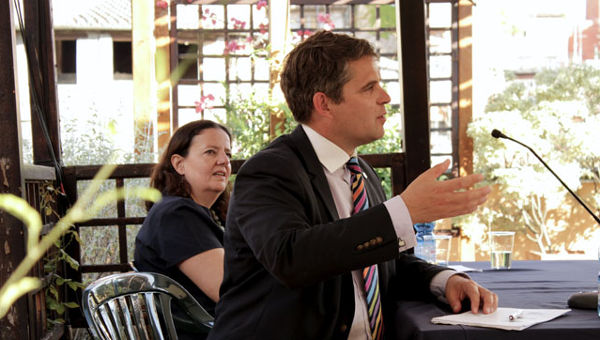JCU Guarini Institute for Public Affairs Debates Crucial EU Issues
On Monday June 15, the Guarini Institute for Public Affairs held the first of two panel discussions devoted to the most pressing problems currently affecting the European Union. Carme Colomina, a researcher affiliated with the Barcelona Centre for International Affairs (CIDOB), presented the situation of Catalonia, where increased centrifugal tendencies have clashed with a quite rigid constitutional framework. During question time, the guest speaker had a rather animated but ultimately constructive exchange of views with a representative of the Spanish Embassy to Italy.
Next was Tomas Jermalavicius, representing the International Centre for Defence and Security (Estonia), who spared no words to indicate the dangerous escalation currently happening in the region: as a consequence of the Russian war on Ukraine, the Baltic States find themselves in the (so far) virtual line of fire and undergo regular provocations staged by their eastern neighbor.
The guest argued that NATO is already being tested by Russia in the Baltics by a mix of military and non-military means and raised some doubts as to whether the Alliance would retain its current unity and cohesion if Moscow succeeded in its efforts to undermine political consensus, through supporting far right and far left parties, and to erode public support within some NATO members towards fulfilling the allied obligations of collective defence. He also argued that finding an adequate response on NATO and the EU level to Russia challenging the sovereignty, territorial integrity and stability of the Baltic states by means falling short of a direct military attack is rather problematic.
The second panel will happen on Monday, June 22 at 6:30 PM on the Secchia terrace and will feature the secessionist drive in Scotland and the tense situation in Greece, following the forthcoming EU summit meeting.
On Monday, June 22, the Guarini Institute for Public Affairs held the second part of the panel discussion devoted to the most pressing problems currently affecting the European Union. Following opening remarks from Guarini Institute Director Professor Federigo Argentieri and JCU President Franco Pavoncello, distinguished guests Mark Shephard, and Tania Bozaninou took the stage.
Shephard, a professor at the University of Strathclyde in Glasgow, began by discussing the referendum for Scottish Independence of September 18, 2014, after which he contrasted media predictions with the actual results of the referendum. He also spoke about the role of social media in mobilizing votes and presented several media outlets’ depictions of the Scottish National Party and Labour Party, including satirical pieces from The Economist and The Sun.
Tania Bozaninou, a journalist from To Vima, the largest Greek daily publication, began her timely discussion regarding austerity measures in Greece. She gave insights into the Greek crisis and illustrated the dramatic situations behind the statistics. Bozaninou explained that salaries have decreased drastically for those who are able to maintain employment and that prices have adjusted based on demand. She added that it is now common to see ordinary people rummaging through trash on the street or, for example, outside a metro station looking for a ticket that is still valid. People have stopped using their buildings’ heating systems and have resorted to simply burning objects in their ovens. They are not concerned with the environmental or health consequences, Bozaninou explained, rather simply with their survival.
Professor Argentieri took the floor to open a Q&A session. The event concluded with some final remarks by President Pavoncello, as he shared a common Italian phrase when referring to Greeks, which is translated as “same face, same race.”
The first part of the panel discussion, held on June 15, featured Carme Colomina on Catalonia’s movement for independence from Spain and Tomas Jermalavicius on security problems in the Baltic States and the ongoing conflict in Ukraine.







